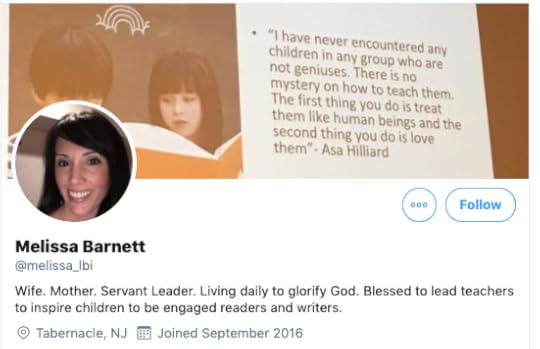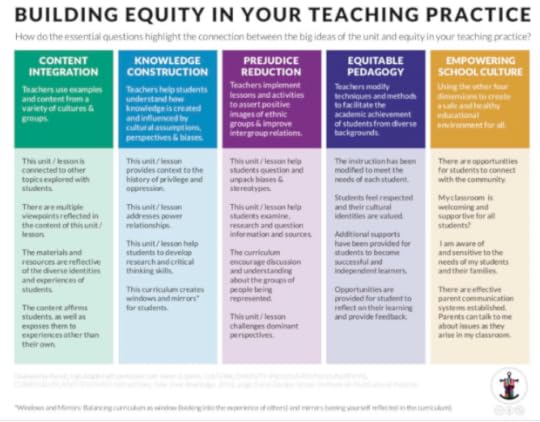Trashing Unwoke Books
This week, dumpsters were filled with books that should have left decades ago @TWPSchools and replaced with engaging, relevant, culturally diverse literature. pic.twitter.com/MoRoV1txsL
— Melissa Barnett (@melissa_lbi) September 19, 2019
https://platform.twitter.com/widgets.js
This woman is the head of “English Language Arts” for the public schools in Washington Township, NJ. That’s right: the head of the English department for public schools in this town celebrates throwing books into the Dumpster. She’s a self-described “servant leader,” and apparently a Christian. Who throws unwoke books into the Dumpster so all the geniuses in her school (and they’re all geniuses) won’t be tainted by what’s in the pages:

In her school, students have “reading identities”:
Freshmen in Mrs. Lopresti’s classes @linwths started their week at a book tasting to pick their independent reading books! No better way to start the week with a joyful heart then talking to kids about their reading identities! @TWPSchools @twppride #TWPReads pic.twitter.com/xUtmmQu2d9
— Melissa Barnett (@melissa_lbi) September 9, 2019
https://platform.twitter.com/widgets.js
I got sucked into Mrs. Barnett’s Twitter feed, and read everything she posted this year. It’s a fascinating look into the mind of one high school English teacher. There is little evidence that she actually loves literature, but lots and lots of evidence that she loves education, and educational theory. In Mrs. Barnett’s school system, they’re all about “equity” in learning. They created a position for a guy, one Steve Gregor, to oversee the implementation of equity there — read all about it. It includes:
Gregor explained with the implementation of this new position, students can expect to see changes in the classroom-level from the fifth grade to high school level, resulting in a more differentiated and personalized approach to the delivery of instruction. This is a result of training teachers in LATIC — learner-active technology-infused classroom.
This teaching approach, according to Gregor, allows students to select individualized learning tasks that appeal to their specific learning style — such as using a podcast instead of writing or taking a test to show what they’ve learned.
Oh lord. Podcasts instead of writing and test-taking, because Bigotry. Teaching as “the delivery of instruction.” This all comes from Prof. Paul Gorski, whose genius (“The lit canon is white supremacy”) tops this blog entry. Mrs. Barnett retweeted this chart approvingly earlier this year:

Those poor children of Washington Township schools. The teachers responsible for their education are throwing old books into Dumpsters, and filling their minds with histories of privilege, oppression, and power. It’s all from Paul Gorski and his “Equity Literacy” idea, which is the Marxisization of teaching high school literature. Look at the Principles Of Equity Literacy:
An important aspect of equity literacy is its insistence on maximizing the integrity of transformative equity practice. That means not being lulled by popular diversity approaches and frameworks that pose no threat to inequity. The principles of equity literacy help us to ensure we keep a commitment to equity at the center of our work and conversation. Download and share these principles here
Direct Confrontation Principle: There is no path to equity that does not involve a direct confrontation with inequity.
“Poverty of Culture” Principle: Inequities are primarily power and privilege problems, not primarily cultural problems, so equity requires power and privilege solutions, not just cultural solutions.
Equity Ideology Principle: Equity is more than a list of simple practical strategies; it is a lens and an ideological commitment.
Prioritization Principle: Each policy and practice decision should be examined through the question, “How will this impact the most marginalized members of our community?”
Redistribution Principle: Equity is about redistributing access and opportunity, so equity initiatives should be about redistributing access and opportunity.
#FixInjusticeNotKids Principle: Equity initiatives focus, not on fixing marginalized people, but instead on fixing the conditions that marginalize people.
One Size Fits Few Principle: Identity-specific equity frameworks (like “the culture of poverty” or group-level “learning styles”) almost always are based on stereotypes, not equity.
Evidence-Informed Equity Principle: Equity initiatives should be based on evidence of what works rather than trendiness.
Did I say “poor children”? I’m not talking about their income or social marginalization. Washington Township, a Philadelphia suburb, is 88 percent white, with a median family income that’s about $20,000 more than the US median family income. Only four percent of the population there lives below the poverty line. In 2008, US News & World Report called it one of the best American places to live. It’s prosperous and stable — and yet, the kids in the public schools are being taught to hate their civilization’s literature.
Podcasting instead of writing or taking a test. An English teacher cheering over trash bins full of icky unwoke books. What a crappy country we are creating!
Meanwhile, there’s always classical Christian education, which would probably reduce Mrs. Barnett and her colleagues to fits of foaming rage. Too many Greeks, not enough technology and educational theorizing.
Advertisement
Rod Dreher's Blog
- Rod Dreher's profile
- 503 followers



